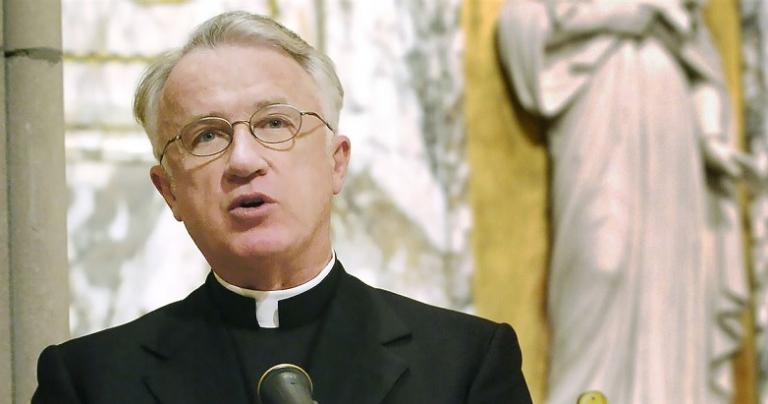
Bransfield and Vanier show us deep problems in how we enable our Catholic leaders and view holiness.
Bransfield, Vanier, and a host of other scandals keep rocking Catholics. This week, the Catholic world reels from learning dark secrets of manipulation and abuse from Jean Vanier. Hailed as “a living saint,” Vanier psychologically and sexually abused at least six women in over fifty years, this all documented in a report commissioned by L’Arche, the very France-based charity organization Vanier founded.
Meanwhile, ABC News reports that the Diocese of West Virginia saw its assets drop by almost $5 million. The reason? The lavish lifestyle of a feudal landlord bishop, Michael Bransfield, who lived high and rich at the expense of his Church (i.e, the People of God), plus the subsequent diocesan investigation into his mismanagement as well as related legal issues. And yes, alleged sexual abuse permeates that situation as well.
Bransfield Beyond Wrongdoing
Bransfield resigned (was forced to?) in September, 2018. He denies doing anything wrong, and we shouldn’t be surprised, really. After all, how can a prince, whether of Church or State ever be wrong? Just ask autocrats in the White House.
Incidentally, I have been informed on several occasions by several Catholics that when it comes to criticizing priests and bishops,“their worst vice is more precious in the eyes of God than a lay person’s highest virtue.” So never criticize them as it invokes divine wrath. I’m not joking.
Bransfield’s successor, Bishop Mark E. Brennan, with support from Pope Francis, desires his predecessor to pay nearly $800 thousand and issue an apology to the faithful. Let’s see what happens.
Lifestyle of Bishop Bransfield: Fit for a King
Bransfield lived high off the hog while many in his flock struggled to get by. ABC News reports that, according to the diocesan investigation, Bransfield misused funds wining and dining, downing expensive liquor and luncheons and parties, relaxing through a string of vacations, and spending on all sorts of luxury items. But Bransfield was also a prolific gift-giver—he let his flock pick up the tab on so many gifts bestowed on bishops and cardinals both in the United States and the Vatican.
Sexual Predators
And things get worse still. Because, allegedly, Bransfield sexually abused people. ABC News reports that the diocesan investigation found allegations of sexual misconduct leveled against Bransfield to be credible. The diocese confidentially settled a lawsuit where Bransfield was accused of sexually molesting and harassing boys and men.
According to the ABC News report, West Virginia Attorney General Patrick Morrisey claims Bransfield knowingly employed pedophiles and disregarded adequate background checks on workers in close proximity with children.
Why Bransfield and Vanier?
Catholic lay leader and “living saint” Jean Vanier, who talked a lot about powerlessness and becoming weaker, is similar to Bransfield in this regard. Coercively, he used the vulnerability of those who came to him for help to his advantage in nonconsensual sexual encounters. When you are in the weak position before a “living saint” (or a “living apostle” in the case of Bransfield), and he abuses you, think of the emotional turmoil that results. To where do you turn for help?
And God forbid you cry out for help! Because then you get branded by other lay people as someone trying to destroy the Church! Just take your secrets and wounds with you to the grave.
Strong leaders attract the insecure, and who hasn’t been insecure at some point? Out of our insecurity, we embrace the clarity of the answer. We crave the fix of being told the answer. This is tremendous power we surrender.
Vanier would verbally agree that there is a problem whenever conversions based on self-hatred happen. To change out of accepting yourself is healthy and good. But there was a catastrophic failure between amazingly wise words and these episodes of coercive abuse. Authentic love may make demands, but it always leaves the other person free. Coercion is not love. Vanier got that verbally and worked for that, but why the abuse?
How Not to Heal
And what should be the good U.S. Catholic lay response to these horrors? Return to the Baltimore Catechisms of the “Catholic Golden Age” and pay, pay, and obey? Have our priests wear birettas and cassocks? Is that what our trusted playbook says to do? Will such 1950s thinking fix the diabolic sickness of the never-ending sex-abuse scandals and the financial abuse scandals?
If only they were faithful, then they would not do these things! And here “faithful” means verbally orthodox.
Is being “more faithful” the solution? Should we increase verbal orthodoxy in seminaries and schools? Is verbal orthodoxy the cure-all for addictions? Because, let’s face it, men like Vanier and Bransfield, although very different types of people, are addicts.
Do you think it’s a good remedy for someone addicted to killing people to spend his days parroting the Sixth Commandment? Would such a therapy prevent further murders? Pretty theological words are already employed by these people. They use them as a cloak!
The Bishop Switcheroo
Transferring and retiring bishops is a complicated mess. Consider when Catholics hear the news that a new bishop will be taking charge over their diocese. Here are two reactions: 1) “Him? Oh, not him! He’s horrible!” and 2) “Who is he? Where is he from?” Don’t think for a moment that the second reaction is better than the first. It’s just as bad, if not worse. You are completely ignorant to who this bishop is! And yet, wham!—he’s your shepherd?
Can you imagine how ridiculous it would be if that’s how it was with U.S. Presidents? One minute you have one POTUS and then—BLAMO!—suddenly materializing is his replacement? Ah, but with bishops it is different, goes the theo-logic of some. Because that’s how Jesus wanted it, someone told me in ignorance. Jesus wanted it that way? If that’s so, how come the practice for the first thousand years of Christ was the people electing those pastors and bishops who would serve them? This also applied to the pope! Only scant few bishops in the first Millennium ever got transferred around different dioceses. So tell me again, please, what Christ desires!
But then again, imagine if we were to democratize the process of choosing bishops. Who would we choose? The wisest, kindest, most compassionate? Or the clerical equivalent of the Kardashians? The freedom of democratic process demands the responsibility of becoming informed. We have been kept ignorant on so many things. And we, the laity, have willfully participated in that.
We are Part of this Catholic Leadership Problem
When it comes to each person’s love, there are limits. When it comes to ministry or Church leadership roles, we ought to only undertake continual activities and long-term roles that are within the limits of our love, actions we can perform with joy. Guilty feelings or shame are terrible engines for holiness. Saint Augustine prayed wisely, “Command what You will, O Lord!—but will what You command!” But many active Christians today doing ministry and justice work would balk at that. They might pray, “Command whatever you want, God! Because I (in ego-violence) will get it done!”
But God sticks close to an honest, cheerful giver. God works with honesty. “You want me to do what, Lord? Wow. Well, right now I will say ‘no.’ I am simply not open. I have much poverty and selfishness in me. Give me the grace, O Lord, and then I will be able.”
It’s easy to demonize the clergy and leaders of spiritual organization. But one way or the other, the clergy and “living saints” emerge out of us, the laity, folks. Show me an addict, says the pscychologist, and I’ll show you nearby a co-dependent. In the great American saga, TWIN PEAKS, “nice guy” and community leader Leland Palmer did horrible, demonic things to his family and daughter, Laura. But what about his wife, Sarah? Sooner or later, viewers have to inquire about the diabolical complicity of Sarah Palmer willfully looking the other way.
Another Lent is almost here. Let us repent and believe the Gospel.
















